Kodu is making a real impact in Ghana, where access to affordable menstrual hygiene products remains a significant issue, particularly in rural areas. Many young women miss school during their periods due to the high cost of sanitary products, leading to significant educational disruption. The problem is even more widespread in Sub-Saharan Africa (SSA), where an estimated 1 in 10 girls miss school because they lack access to proper menstrual products. Kodu is addressing this issue head-on by producing affordable, biodegradable sanitary pads made from banana fibres, a locally sourced by-product of the banana plant.
The idea for Kodu was born out of the Kosmos Innovation Center (KIC) Challenge, a competition designed to inspire young entrepreneurs to develop solutions to pressing social and economic problems in Ghana. Iddi and his co-founder, Umar Farouk, participated in the challenge in 2021, where they initially explored various business ideas. The turning point came when they recognised the dual challenges facing many young women in Ghana: a lack of access to affordable menstrual hygiene products and the environmental impact of agricultural waste, particularly banana plant waste. They realised that banana fibres, which are normally discarded after the fruit is harvested, could be repurposed into an absorbent, eco-friendly material for sanitary pads.
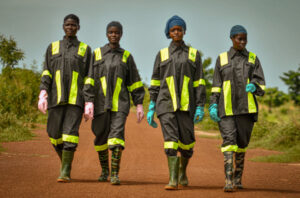
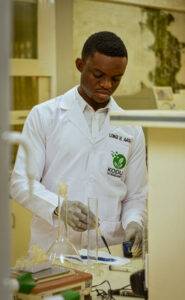
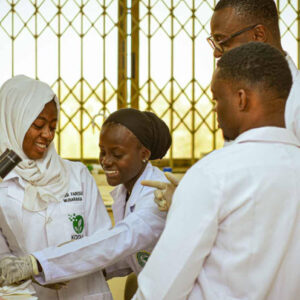

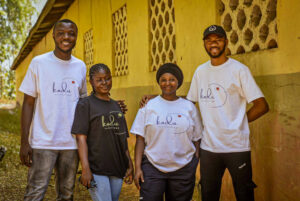

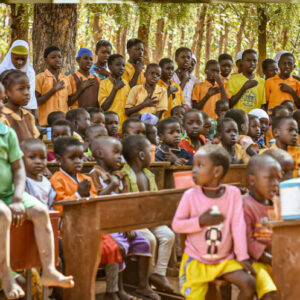
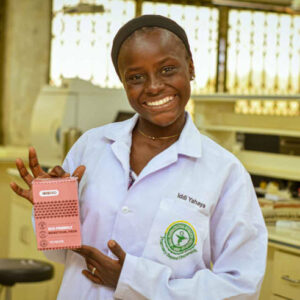
Through the KIC Challenge, Iddi and Umar worked to refine their concept, receiving guidance from mentors and experts who helped them transition from an initial idea to a viable business plan. “Kosmos Innovation Center didn’t just support us financially. They provided us with mentors and programme officers at every stage, guiding us through product development, testing, and even setting up the donation initiative for our pads,” said Iddi. The support they received from Kosmos Innovation Center was instrumental in this journey, providing them with the resources and mentorship needed to navigate the challenges of starting a business. After months of research and development, Kodu was officially incorporated in 2022 and began producing its first line of sanitary pads.
The banana fibres used in Kodu’s pads are not only strong and absorbent but also biodegradable, offering a sustainable alternative to synthetic sanitary products, which can take hundreds of years to decompose. This focus on sustainability is crucial in Sub-Saharan Africa, where waste management systems are often underdeveloped, and environmental degradation is a growing concern. By using banana plant by-products, Kodu is addressing both the need for menstrual hygiene and the environmental impact of agricultural waste.
Kodu’s mission extends beyond simply selling affordable sanitary products. Recognising that even a product priced at $0.61 per pack may still be out of reach for some, Kodu has implemented a social responsibility initiative. For every 10 packs sold, Kodu donates one pack to girls who cannot afford to buy their own. “We partnered with KIC to create a social responsibility initiative where for every 10 pads we sell, we donate one to people who cannot afford it,” Iddi explained. This initiative is crucial in areas where the cost of sanitary products is prohibitively high. In Ghana alone, menstrual hygiene is an ongoing challenge for millions of women, and without access to affordable products, many young girls are forced to stay home from school during their periods, compounding educational disparities.
The response from the communities where Kodu operates has been overwhelmingly positive. The company’s outreach efforts include not only providing affordable pads but also conducting educational programmes in rural areas. These initiatives aim to break the stigma surrounding menstruation and teach young women about safe menstrual hygiene and disposal practices. So far, Kodu has conducted educational outreach in six communities in the Northern Region of Ghana, where many girls are forced to miss school during their menstrual periods. The stigma and lack of access to products lead to further isolation and missed educational opportunities, a situation Kodu is working to change.
Kodu has garnered significant attention and recognition for its innovative approach. In 2024, the company was featured in Forbes magazine for its use of banana fibres in sanitary products, positioning it as a pioneer in sustainable menstruation solutions. In addition, Kodu has won several awards, including the Standard Chartered Women in Technology Award and the African German Entrepreneurship Academy Award. These accolades highlight the impact Kodu is making, both in terms of providing menstrual hygiene solutions and promoting environmental sustainability.
Since its inception, Kodu has grown steadily. The company is now focused on expanding its product line to meet the needs of women with heavier menstrual flows. While the current product line is well-suited for light flow, the team is actively working to develop products that cater to a broader range of needs. Additionally, Kodu hopes to expand its social responsibility initiative, ensuring that no girl in Ghana has to miss school because of her period. “KIC created a platform that allowed us to collaborate with experts and peers. It’s more than just entrepreneurship training—it’s a community that genuinely supports your vision from start to finish,” Iddi added.
For many women across Sub-Saharan Africa, lack of access to menstrual hygiene products is a barrier to education, economic participation, and even basic dignity. Research shows that about 65% of women and girls in the region cannot afford sanitary products, and many resort to unsafe alternatives such as rags, paper, or even leaves. By addressing this issue with locally sourced, biodegradable products, Kodu is not only helping to solve the immediate problem of menstrual hygiene but also contributing to long-term environmental and social change.
Looking ahead, Kodu aims to scale its operations and reach more communities in Ghana and beyond. Iddi and Umar’s vision is to ensure that every girl, regardless of her background or financial situation, has access to the menstrual hygiene products she needs. At the same time, they hope to continue reducing the environmental impact of banana plant waste, turning what was once discarded into something that can empower women and protect the planet.
Kodu’s journey, from a simple idea in a business challenge to a company making real social and environmental impact, is a testament to the power of innovation and entrepreneurship. By combining a focus on sustainability with a commitment to social responsibility, Kodu is helping to change the lives of young women in Ghana, one day at a time.
